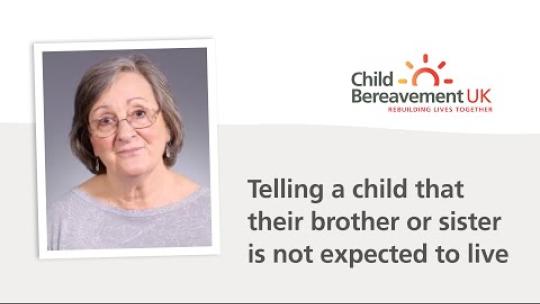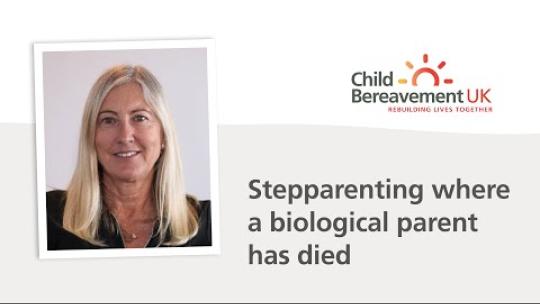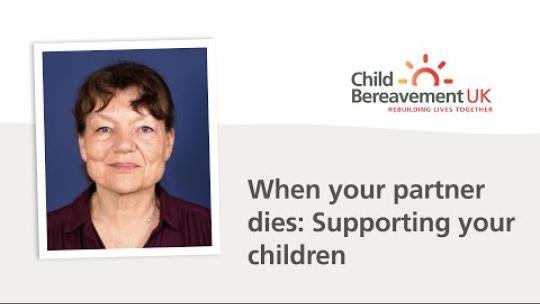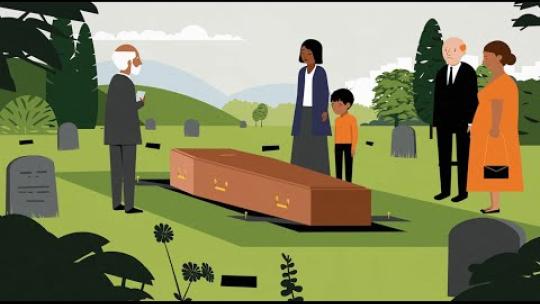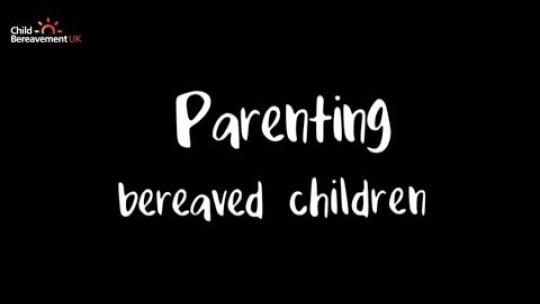Supporting grieving children
In your work as a healthcare professional, you may encounter families who ask you how they may explain a death or loss to their children. Your answer will vary depending on the child's age and developmental level. On this page, you will find information to help you guide caregivers through what they can say and do to support their grieving children.
How school-age children understand death and experience grief
Beginning around age 5, children gradually start to develop an understanding that death is permanent and irreversible, and that the person who has died will not return. Children who have been bereaved when they were younger will have to re-process what has happened as they develop awareness of the finality of death.
Children’s imagination and ‘magical thinking’ at this age can mean that some children may believe that their thoughts or actions caused the death, and they can feel guilty. Not being given sufficient information in age-appropriate language can lead them to ‘make-up’ and fill in the gaps in their knowledge. Some children might feel that somehow what has happened was their fault. If they feel this way, some react to this by being especially good to make up for their sense of ‘badness’. Others behave badly to attract the punishment that they feel they deserve. Even when there is no expectation to do so, a child may take on the role of caregiver for a surviving adult or siblings. In an attempt to appear grown up, they might take on inappropriate adult responsibilities.
Children increasingly become aware that death is an inevitable part of life that happens to all living things. As a result, they can become anxious about their own, and others’, health and safety. Therefore, children at this age need honest answers to their questions that can be built on over time, and opportunities to express their feelings. They may also need reassurance that nothing they said or thought caused the death.
How can I help and what can I do?
Grieving is exhausting for everybody, child or adult, but is eased if everyone can do it together and find their way through as best they all can. You can do a huge amount by carrying on as much as you can with the usual routines of home, school, time with friends, etc. At the same time, try to support one another when the grief feels all-consuming.
In the early days after a death, what children of any age need is extra care and concern from the adults around them. Sudden death means there may be no opportunity to say goodbye and children can feel very angry with their parent or sibling who has died and left them. They may have regrets about something they said or wish they had said. They need to know from parents and caregivers that they are still loved, that they will continue to be looked after and that they will be involved in any decisions that affect them.
What else is needed in the following days and weeks will be dependent on how the child responds, their individual personality, and the circumstances of the death. It is completely normal to feel out of your element and unsure what to do next. It might help to remember that grief is a normal response to a death and no one knows your child better than you. Provided with love from their family, and support from friends and school, most children do not need professional help, but if you are in doubt about this, please do seek guidance.
How truthful should adults be?
Adults naturally want to protect, but children have a much greater capacity to deal with the harsh realities of life than we realize, as long as they are told in an appropriate way. Even a very sad truth will be better than uncertainty and confusion. What a child does not know they tend to make up with their imagination, and their fantasies can be very distressing to them and difficult to deal with.
Children and young people need information given in words appropriate for their age and understanding. Without information, they cannot start to make sense of what has happened. Children pick up on atmosphere and will be aware that there is something that everyone else knows about but them. This can create feelings of exclusion and isolation from the rest of the family.
When there are no secrets, a family has the chance to get closer together; the children can trust in the adults around them and are more likely to express their feelings more freely, talk about any fears, and be able to receive reassurance and comfort.
‘It helps to know why everyone in the family is sad and worried because when you don’t know what is happening you can’t help thinking it’s your fault.’
The word ‘dead’ feels harsh, should it be used?
Phrases such as ‘gone to sleep’ or ‘passed away’ or words such as ‘lost’ may feel kinder, but are misleading and can lead to confusion and complication. For example, adults often encourage children to find things that they have lost, so they may continue to look for the person who has died. Similarly, using the term ‘gone to sleep’ may lead them to associate going to sleep with dying which can result in anxieties at bedtime.
Saying the person ‘went away’ may cause the child to feel abandoned or think he or she did something wrong and is no longer loved. Our information sheet Explaining to Young Children that Someone Has Died will give you words to use to explain the concept of death to your child.
Use simple words appropriate for the child’s age and understanding. It is much more helpful for children when adults use words such as ‘dead’ and ‘died’ rather than euphemisms.
They keep asking questions, how should they be answered?
Questions need to be answered honestly, and in simple language suitable for the child’s age and understanding. This may seem harsh, but bereaved children tell us that they need adults to speak to them in a way that is clear and unambiguous. It is helpful to reassure a child that it is OK to ask questions and to talk about what has happened.
Children are very literal and may have a different understanding than adults of words such as ‘heart attack’. It is easy to assume that they know what we are talking about. Check their understanding by asking them what they think a heart attack is.
Young children may need repeated explanations and answers. This can be very wearing and hard to deal with, but it is a child’s way of putting together all the pieces of the puzzle. Questions from a child are sometimes not about getting more information, but more a way to check that what has happened is true and not just a bad dream.
Will they need any time off school and if so, how much?
When their world has fallen apart, the familiar routine of school can feel safe and secure and is a helpful reminder for a child that not everything has changed. As was said earlier, what bereaved children and young people want is a sense of normality. School can provide this. School also offers a chance to have some time off from grieving.
Most of the bereaved children we have spoken to want to get back to school after one, or at the most a few days. Some children do need a few days more at home, but the longer they are away, the harder it is to return. Returning to school after the death of someone important should be handled sensitively and the child should be asked how they would like this to be managed. It is always a good idea to let school know what has happened and to keep in touch with staff.
How can adults help grieving children express their feelings?
Children of all ages do not like to feel under pressure to express powerful emotions; it can feel too painful or just not the right time. Talking is only one way of doing this and for many young people, it is not what they find easy to do. There are alternatives. A shared activity such as walking the dog or playing a game takes off the pressure and therefore can be a time when a child will start to share thoughts and feelings. Developing a memory box together is another idea to encourage communication. Working through an activity or workbook together can be another good way to gently open the door on the subject.
Should grieving children be disciplined?
Children can feel very out of control and scared when experiencing the death of someone important and may respond with challenging behavior. Your usual daily structures and routines will feel comforting for a child of any age, but especially young children. Try to change these as little as possible, although this may feel very difficult to do when you are exhausted emotionally and physically. Try to continue with normal standards of behavior but ‘normality with compassion’ is a good rule of thumb. Anger forms a large part of the grieving process and children of all ages will express it in various ways.
Giving the message that it is understandable for them to be angry is what they need to hear. However, they also need to know that it is not acceptable to hurt themselves or anyone else. Safe ways to release anger include bashing cushions, vigorous physical exercise, a very messy painting session involving hands, going outside to shout very loudly and throwing wet sponges against a brick wall. Any of them can help.
How long do children grieve?
Children and young people will continue to grieve for life. With support from adults around them, they will learn to adjust to life as it has become, rather than how it used to be, but the loss will always be with them. One adolescent described:
“I didn’t feel anything for the first 3 months. For the next 6 to 8 months I couldn’t really handle myself or my feelings. Then after that, it took me a long time and a lot of tears but I managed to calm down. Ever since then it’s like a long road up a hill.”
Children and teenagers may need to look again at the details surrounding the death of an important person in their lives as they grow older. Feelings they had when young will be different several years further on as their understanding matures and the meaning of the death changes as they move through life. This is not unresolved grief but the experience of different feelings later in life, often connected to major life events such as moving up to high school or other transitions.
Is it okay for children to see adults upset?
Children need their caregivers to serve as models, not heroes. Caregivers should be encouraged to share their feelings with their children; children learn to grieve from the adults around them. If caregivers are open and expressive, their children are likely to be so too. On the other hand, they will learn to close down and bottle up emotions if adults are distant and always attempting to keep their feelings under control.
Caregivers likely have their own grief to deal with, which at times will understandably be overwhelming. It is difficult for children to share emotions with an adult who is continuously overcome by grief or depression. If they can can, adults should share the load and get support from friends and other family members by asking them to have the children for a few hours. This will give them space to express any raw grief without having to maintain some control for the children, resulting in them feeling stronger for times when children are around.
Sometimes it can help for the child to talk to someone who is not emotionally involved
This could be a family friend, or other adult, who is prepared to give some time and simply listen without judgment. Teachers can play an important role here, particularly in a elementary school, as they see a child on a daily basis and can keep a look out for signs of distress or changes in behavior.
Caregivers should keep in contact with their child’s school and ask them to ensure, without going into detail, that all staff are aware of what has happened. Children are very protective of adults they care about and may choose to talk to someone else in order to avoid causing further distress. Teenagers often say that they find sharing experiences with people their own age (often via the internet) to be helpful.
Family pets may take on a new significance. One young boy indicated that his dog was a source of comfort because it felt warm and soft to cuddle. It let him talk as much as he wanted to without interruption, didn’t judge him, and gave him unconditional love and affection.
